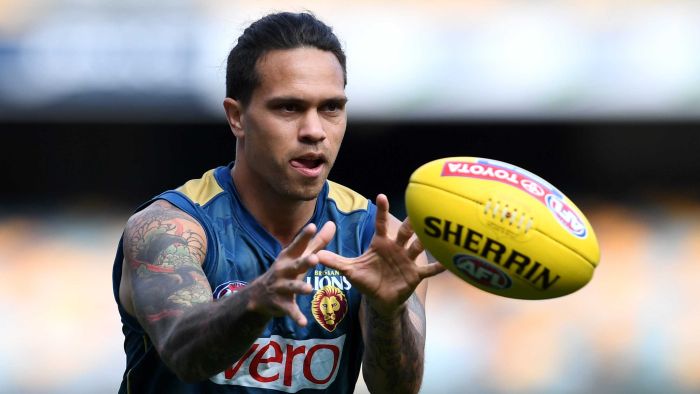In the wake of the report into systemic racism at the Collingwood Football Club, former Cat and Lion Allen Christensen has said he was lucky to play at clubs that did not have the same issues.
Key points:
- Allen Christensen says Collingwood president Eddie McGuire should have been ousted in 2013
- McGuire infamously suggested Adam Goodes should promote a King Kong musical, just days after he was racially abused
- Christensen detailed how social media abuse can trigger intergenerational trauma
Christensen, whose family are from the Tiwi Islands, told Radio National that in his nine years in the AFL with Geelong and Brisbane he had not experienced the sort of systemic issues outlined in the Collingwood report that was leaked on Monday.
The veteran forward said the problems at the Magpies were not particularly surprising, considering club president Eddie McGuire’s history.
“They say the fish rots from the head,” he told Patricia Karvelas on RN Drive, adding McGuire’s tenure as president should have ended in 2013.
Christensen, who retired after the 2020 season, said McGuire “should have been done” when he said on his radio show that Adam Goodes could promote a King Kong musical, just days after the Sydney Swans legend was racially abused by a young Collingwood supporter.
“The list [of public missteps] is pretty long for a guy who’s the head of a football club,” Christensen said.
“He’s done a lot right and a lot for football, but when it comes to culture … there’s this culture that’s been able to manifest at Collingwood.
Christensen said while he did feel welcomed by his clubs in Geelong and Brisbane, it was not until later in his career that he found his voice in promoting Indigenous causes as a player in the league.
Christensen made his AFL debut as a 19-year-old with Geelong back in 2011 and previously described a trip with fellow Cat Josh Walker to Gove in the Northern Territory as “igniting a fire”.
When he arrived in Brisbane after the 2014 season, Christensen said the Lions were not as connected as they could have been with the local Indigenous community and he was proud to play a role in changing that.
“[Part of that change] was not just rolling players out in Indigenous Round and NAIDOC week,” he said.
“That’s the mindset that some other clubs have, which is certainly not the case.”
While the Lions were supportive as a club, the same could not always be said for the fans.
He outlined a 2019 incident in which a Lions member racially vilified him on social media and said, while it was heartening to see “hundreds” of other fans holding that person to account, he “couldn’t stop crying” after reading it.
At first, Christensen said he viewed the comment as just another remark by another internet troll — “I’ve been called worse” — but he broke down in tears a couple of minutes later, detailing how those sort of personal attacks can spark intergenerational trauma.
“For thousands of years Indigenous people have been telling each other stories … [and] from 200-odd years ago, stories have been passed down of pain from generation to generation,” he said.
Christensen said no matter how many allies he knows are out there, one comment can have a devastating impact.
“There’s a lot of people now who think it’s OK to just say whatever you want and get away with it,” he said.
“If you’re an Indigenous player and you do something wrong on the field, they can target you and your culture.”







